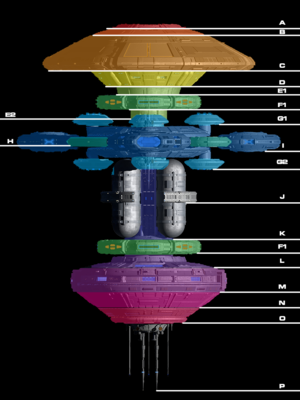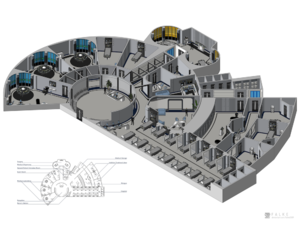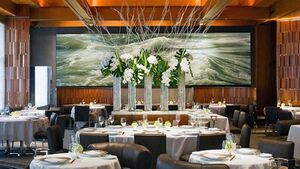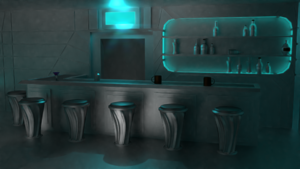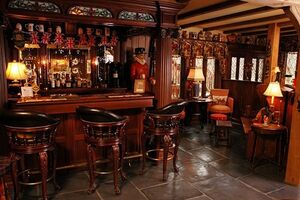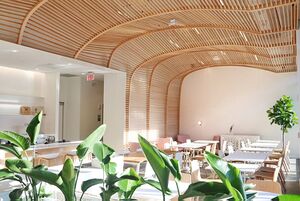Difference between revisions of "Starbase Bravo"
m |
m (Updating the class value to work with updates to the Starbase infobox) |
||
| (2 intermediate revisions by 2 users not shown) | |||
| Line 3: | Line 3: | ||
| image = [[File:Guardianclass.jpg]] | | image = [[File:Guardianclass.jpg]] | ||
| registry = Starbase 4 | | registry = Starbase 4 | ||
| class = | | class = Guardian | ||
| commission = 2398 | | commission = 2398 | ||
| decommission = | | decommission = | ||
| Line 18: | Line 18: | ||
| dedication = | | dedication = | ||
}} | }} | ||
''' | '''Starbase Bravo''' is the headquarters of the [[Fourth Fleet]]. Consisting of surface facilities on the Mellstoxx III and a large, modern [[Guardian Class|Guardian-class]] spacedock in orbit, this base provides Fourth Fleet Command with a well-equipped operational hub with command and control facilities, repair and maintenance yards, and a satellite Starfleet Academy Campus. In addition to these primary facilities, there are additional surface bases and minor space stations in the [[Mellstoxx system]] that are all under the auspices of Starbase Bravo. | ||
Starbase Bravo is the second facility to bear this name in the Mellstoxx system. The first, a Spacedock-class starbase, was decommissioned and replaced with the current station in early 2399. | |||
== Organization == | == Organization == | ||
Latest revision as of 17:03, 15 July 2024
For information on joining the Starbase Bravo sandbox, consult the Starbase Bravo Guide.
Starbase Bravo is the headquarters of the Fourth Fleet. Consisting of surface facilities on the Mellstoxx III and a large, modern Guardian-class spacedock in orbit, this base provides Fourth Fleet Command with a well-equipped operational hub with command and control facilities, repair and maintenance yards, and a satellite Starfleet Academy Campus. In addition to these primary facilities, there are additional surface bases and minor space stations in the Mellstoxx system that are all under the auspices of Starbase Bravo.
Starbase Bravo is the second facility to bear this name in the Mellstoxx system. The first, a Spacedock-class starbase, was decommissioned and replaced with the current station in early 2399.
Organization
Between the primary station, subsidiary stations, and planetary facilities, Starbase Bravo has a crew of just over 100,000. Under the command of a vice admiral, this installation is among the largest in the Federation. Individual divisions often have more personnel than whole task forces of ships, under the direction of captains, with departments and sections under them. The senior command staff report to both the Fourth Fleet hierarchy and to Starfleet Command, as this installation is not only the central command authority for the Mellstoxx Sector and all of the ships within it, but also the headquarters for the Fourth Fleet.
In addition to fixed defensive emplacements and a rotating cadre of visiting starships, Starfighter Division Sierra Bravo Four (SB-4) provides the installation with mobile scanning, interdiction, and patrol support, under a captain reporting to the base's commanding officer.
The local Starfleet Academy campus shares facilities with Starbase Bravo, though reports through the Starfleet Training Command hierarchy and not to the base itself, though many cadets and trainees are seconded to starbase departments for apprenticeship and job shadowing purposes, or for midshipman cruises.
Facilities
The Spacedock
The original spacedock was constructed during times of tension with the Klingon Empire and the long, cold silence from the Romulan Empire, and was thus within striking distance of both territories. Ahead of Starfleet’s return to the frontier, a Guardian-class station was commissioned to replace the ageing Spacedock-class station, as Starbase Bravo is intended to serve as a launching post for some of Starfleet’s most vital operations. In addition, there are a number of planetary facilities and other smaller space stations, all of which are collectively part of Starbase Bravo.
Combining the functions of a repair and construction facility, an orbital habitat, a commercial hub, and a major defensive installation, Guardian-class stations are the largest and most powerful starbases in the Federation. From a distance, it is clear that they combine a number of construction strategies in use by older classes: the modularity of the Regula class and her descendants, with the massive spacedock first designed for the eponymous Spacedock-class.
Studded with docking bays of all sizes, Starbase Bravo is home to hundreds of departures and arrivals on an average day and thousands on a busy day, not even counting the fleet of shuttles, work pods, and runabouts that are constantly coming and going from her hangers. At any one time, you can expect a dozen or more starships to be in dock in various states of construction, repair, or maintenance.
A distinctive feature of the Guardian-class is it's eight quad impulse engines, mounted in two groups of four in the station's upper and lower reactor modules. These massive engines keep the station in orbit well above the atmosphere of Mellstoxx III with their red glow. Between these impulse engines are eight large deflector arrays, which both keep the space lanes around the station clear of debris and help provide the station with intensely powerful shields.
Layout
- Sector Alpha-Red (Decks 1-20): The Command Section, home to ops, command and control systems, the six main computer cores, and senior staff offices and quarters
- Sector Bravo-Orange (Decks 20-60): The Arboretum, ringed by offices and quarters for diplomatic missions, diplomatic personnel, and senior staff
- Sector Charlie-Gold (Decks 60-150): The Primary Docking Bay, reserved for large or long-term dockings.
- Sector Delta-Yellow (Decks 150-210): The Shipyard, with six construction bays, two of which are large enough for a Sovereign-class explorer.
- Sector Echo-One-Green (Decks 210-230): Engineering support, containing workshops and support systems for the shipyard above and reactor below.
- Sector Foxtrot-One-Emerald (Decks 230-260): Upper fusion and antimatter reactors, deflector arrays, and impulse engines, which keep the station powered, stationary, and protected.
- Sector Echo-Two-Green (Decks 260-300): Life support systems, additional engineering support, and an auxiliary control center.
- Sector Golf-One-Cyan (Decks 300-330): Six upper defence pods, containing torpedo turrets, shield generators, and a hangar for Starfleet shuttlecraft.
- Sector Hotel-Turquoise (Decks 360-390): Scientific labs and medical facilities, including the station’s primary hospital. Facilities have extendible docking ports for Starfleet use.
- Sector India-Navy (Decks 330-420): The Central Hub, holding the majority of the civilian quarters and the promenades, as well as the Commercial Docks.
- Sector Golf-Two Cyan (Decks 420-450): Six lower defence pods, containing torpedo turrets, shield generators, and a hangar for Starfleet shuttlecraft.
- Sector Juliet-Silver (Decks 450-600): Deuterium fuel tanks, and docking facilities to refuel ships or take on more fuel.
- Sector Kilo-Indigo (Decks 450-600): Facilities for the station’s crew, including quarters, holodecks, recreational spaces, and lab spaces.
- Sector Foxtrot-Emerald-Two (Decks 600-630): The lower fusion and antimatter reactors, deflector arrays, and impulse engines.
- Sector Lima-Violet (Decks 630-660): Hangars for civilian and Starfleet ships, and additional cargo bays.
- Sector Mike-Purple (Decks 660-700): Secondary docking bays for short-stay and smaller Starfleet ships, as well as large civilian vessels.
- Sector November-Magenta (Decks 700-740): Cargo storage, auxiliary life support, computer cores, and an additional auxiliary control center.
- Sector Oscar-Pink (Decks 740-780): Additional crew and civilian quarters, as well as guest quarters.
- Sector Papa-Black (Decks 780-800): The main communications repeater and antennae.
Command and Control Facilities
Station Operations is located near the top of the station, and is the area from which the station is controlled. Mirrored by three identical spaces at 90 degree intervals around Sector Alpha-Red, this large facility serves the same role that a starship's bridge does and it handles long-range docking and approach operations until a vessel is close enough to be transferred to one of the spacedock or hanger control centers. There are several large conference facilities in this area, as well as office space for the station's senior leadership.
Engineering Facilities
The starbase also has Shipyards facilities, with six construction bays which can be used to construct or refit starships. Two bays are large enough to hold starships up to the size of a Sovereign-class explorer, while the other four are limited to light cruisers or frigates. These bays are always pressurized and are sealed off from the main docking bay above them with large doors.
Science Facilities
There are two major science modules in Sector H-Turquoise, containing a wide variety of scientific labs. Both modules have extendable docking ports, reserved for Starfleet vessels only. These are the facilities where the majority of the station’s research and study takes place. Further, smaller lab spaces can be found in other areas, particularly among the crew facilities of Sector K-Indigo.
Medical Facilities
Two medical modules in Sector H-Turquoise provide the central facilities for the station. Normally only one is operational, acting as the central hospital with the capacity to house up to 2,000 patients. The second is as large, but is commonly kept on standby for emergencies. Both modules have extendable docking ports, reserved for Starfleet vessels only. Routine care is supplemented by six infirmaries spread throughout the station, including one in the command level and one between the two promenades.
Smaller medical stations are located elsewhere on the station to provide first aid or emergency care, most with just one or two biobeds, medical supplies, and either holographic medical support or an on-call medic or nurse. These are most numerous on the Promenade, in living quarters, or the engineering and docking facilities.
Security Facilities
Security operations aboard are divided across 10 precincts, determined by responsibility and area of operations than necessarily size. The majority of precincts focus on internal security for restricted or sensitive areas, served by security officers to support their patrol and guard operations.
The largest precinct is Promenade Security, which has the biggest central office in Sector I-Navy. Officers in the Promenade Security Precinct act as law enforcers and peacekeepers in the busiest and most public area of the station. The distantly second-largest precinct supervises the Commercial Docks in the same sector, monitoring newly arriving vessels and conducting customs duties.
Leisure Facilities
Starbase Bravo is equipped to provide recreation and leisure opportunities for beings of all physiologies, on a short or long-term basis. To cater to a standard crew of 85,000 and anywhere between 20,000 and 40,000 civilian residents living aboard the station at any one time, there are two-hundred holodecks and four-hundred holosuites, in addition to an equal number of gymnasia, sports courts, bars, replimats, restaurants, shops, galleries, and lounges.
While recreational facilities are spread throughout the station, many are concentrated alongside spaces for commercial tenants on the station's two promenades, which runs the circumference of the large hub in the center of the station above and below its cargo facilities. These spaces each provide five decks of space for venues of all sizes.
Vandorin's Bistro
As the most luxurious and in-demand dining establishment on Starbase Bravo, Vandorin's is exclusive and hard to get into no matter if the docking bay is full or empty. You either have a table at Vandorin's, or you do not. Run by Esterra Vandorin, a Betazoid chef of impeccable taste, the bistro seeks to provide the most evocative gastronomic experience on the station. Unsurprisingly, it is easier for admirals, diplomats, and highly-respected experts to jump the waiting list and enjoy a booking. With white-linen service, fresh food, music provided by a real string quartet, and Esterra themselves often on-hand to provide recommendations, dining at Vandorin's is pure joy. Esterra also has several private dining rooms to hand for secure meetings over dinner, as they understand their clientele.
Vandorin's Bistro In-Play
- During the Osiris Initiative, this space was host to several highly exclusive gatherings for the fleet's biggest big wigs. It's the place that you think of when you hear about backroom dealings or agreements hashed out in smoky rooms. If you're a cadet, you're unlikely to get in here.
- Some flag officers use this as either a special treat for visiting captains or their staff or as a way to intimidate the uninitiated. So, if you're invited here for lunch, it either means you're in the 'in crowd', or you're being tormented.
Downtime
Run by Skal, a brusque Tellarite, Downtime is the bar of choice on Starbase Bravo for Starfleet officers wanting a no-frills drink. The fixtures are similarly plain: all spacer’s smooth metals and functional furnishings. The bar has a history from the original spacedock, and has moved over to the new station, so some of the furniture and even the replicator seem old-fashioned compared to the brand new starbase they now inhabit. Skal is a former Chief Petty Officer who takes a perverse delight in now speaking his blunt mind to officers, given that he can no longer suffer any repercussions from doing so. The walls are adorned with replica plaques of starships whose captains Skal and his predecessors have served drinks to, going back to the original Starbase 4’s construction, or else other Starfleet memorabilia. Civilians rarely go here.
Downtime In-Play
- While Ten Forward was replete with pastels and comfortable furniture, Downtime is much more utilitarian. Tritanium and duranium everywhere to make it easy to clean. It's not the sort of place you go hoping for trendy cocktails or an interesting atmosphere. It's where you go to be by yourself for a drink at the end of a long shift.
- Junior officers often think that going here is part of the Starbase Bravo experience, and can congregate in loud groups that earn the ire of the bartender. If you're going here, act like you belong there or you'll quickly be corrected.
The Gate Inn
An old-fashioned pub-style establishment, run by the ever-helpful proprietor who’s only ever given his name as ‘Terry.’ The Gate Inn, so named for the station’s position on the threshold between Core Worlds and the Federation’s old frontier, is a new arrival at the station. It is decorated much as an ancient Earth pub, with wood-panels and a floor that is somehow always a little sticky. Terry specialises in good beers, but also does a line in hearty pub food. Considering he probably uses a replicator, his limited menu is clearly an affectation.
The Gate Inn In-Play
- This is the sort of pub you would encounter in the modern day at an airport or at Epcot; it's more of a gimmick than an authentic experience, but at least it's got a 'real' proprietor and not a hologram!
- You probably go here when you're tired of the ultra-sanitized interior of the rest of the station. It's a taste of terrestrial living without needing to beam down to the planet.
Brew
One of the coffee shops on the promenade, Brew is bright and relaxed. Specialising in a wide variety of hot drinks and baked goods from across the quadrant, it offers both comfortable lounging space as well as decent table space for more intimate or professional engagements. The lighting has been specifically designed, along with the array of potted plants, to evoke a more ‘planet side’ feel. This is often a spot that crewmembers or visitors go for a change of pace from normal life on the station, as it takes a lot longer to get a cup of coffee from a shop that must make it from scratch rather than replicating it. Some folks swear up and down that it tastes better than anything a replicator can make, but it's often a little bit of an adjustment for individuals who aren't accustomed to the caffeine and acid content of real coffee.
Brew is operated by Starfleet and is staffed with holograms, rather than organic baristas.
Brew In-Play
- Less a Starbucks or even your favorite neighborhood quirky coffee shop, this is more like a museum café than anything else. Sparse, bright, and modern, it's a place for a quick cup of coffee or even a date with an authentic cup of coffee, but it's also subtly polished and chic.
- Because there are no organic baristas, you can be assured of the 'staff' always knowing what your order is and being able to make it exactly the same every time, as long as the ingredients are available.
Docking Facilities
The starbase has two large docking facilities on the upper and lower ends of the station. The upper section holds the primary docking bay, which is secured from the vacuum of space by four large doors. This docking bay is reserved for the largest ships or ships that will be staying docked for more than a few days; otherwise, ships use the docking bay on the other end of the station. Normally, this area is unpressurized, but it can be pressurized to accommodate complicated repairs that require shirt-sleeves conditions. A central tower has four wings, capable of docking up to twenty-four large starships, or larger numbers of smaller ones. The lower section of this sector is ringed by twelve cargo bays that are open to the interior and have their own smaller space doors. The docking bay is connected to the six construction bays in the level beneath it with a series of internal doors.
The lower facility does not have space doors, and is used by starships up to heavy cruiser sizes that are not staying at the station for very long, as well as for large civilian vessels. There are two large bays which each go 1,000 meters into the station and can dock up to 12 ships each. There are also six smaller bays, suitable for freighters, runabouts, and other small vessels.
In the Central Hub are the Commercial Docks: Two docking modules suitable for small freighters that also contain the station’s four runabout pads. Additionally, there are two larger docking modules with bays large enough to house capital ships, but these are generally reserved for civilian use.
There are dozens of smaller docking bays and hangers across other areas of the station. It is always buzzing with activity.
Available Small Craft
Starbase Bravo carries all manner of shuttlepods, shuttles, and runabouts. You can learn more about them here.
Shore Facilities
Shore facilities on Mellstoxx III include a Starfleet Medical hospital, several villages for personnel accommodation, and a Starfleet Academy campus.
Starfleet Medical
In addition to the two hospital modules aboard the station itself, there is a major Starfleet Medical facility on the planet's surface, which has significantly more space for specialized treatment centers and bed space for long-term care. It provides medical care for the colony's population as well as overflow space for patients brought to the orbital station from outside the Mellstoxx system.
Defense Facilities
As per Betazoid custom, there are no surface-to-orbit weapons systems on Mellstoxx III, but there are powerful planetary shield generators that can thwart most attempts to bombard the surface. There is also a network of defensive satellites covering areas out of reach of the spacedock's defenses. While normally controlled from the station itself, there is an auxiliary control facility deep beneath the planet's capital city, which also has secure command and control facilities for the Fourth Fleet.
Accommodations
Most personnel assigned to Starbase Bravo live either on the main station or the outlying station they are assigned to, but personnel assigned to surface facilities and some senior members of the station's crew are afforded housing on the planet's surface. These comfortable accomodations are ideal for raising a family in the idyllic setting of Mellstoxx III's pastoral landscape. Arranged into several villages with their own education and medical facilities, approximately ten percent of the base's crew can be housed here. Many senior Fourth Fleet officials also choose to live here rather than on the station. Regular commuter runabouts and public transporter stations are provided for officers and crew who don't rate a personal shuttle.
Bravo Fleet Academy Campus
The Bravo Fleet Academy Campus (technically known as Starfleet Academy—Mellstoxx IIII) is the main facility through which officers entering the Fourth Fleet pass, either spending all four years of their training there, or sometimes just a few weeks, depending on their course of study and other factors. This campus has the capacity for 10,000 students and graduates about 2,500 officers per year. As a Betazoid colony, this academy campus is especially known for its counseling program, though it is a full-service academy.
The facility itself has several dormitories, classroom buildings, and athletic facilities, all designed to the highest standards of Federation engineering. The campus is clean, modern, and peaceful, with large grassy areas between the buildings and a quadrangle containing several hundred tree species. Cadets generally spend most of their time on the surface, though they are permitted to visit the main starbase for leisure activities and for certain training exercises.
Parade Field
The Parade Field is used for large gatherings of the student body and for training exercises, retaining its name from several ancient academies on Earth. Cadets rarely actually are asked to march or parade in the modern Starfleet, but this large field can also be used for sporting events and as a landing area for shuttlecraft when large movements of people are required.
Cadet Union
The Cadet Union is a large student support facility that has mess halls, lounges, academic advisors and tutors, as well as holodecks. There are a number of cafes as well that offer places for cadets to study.
Classroom Buildings
The classroom buildings on this campus are all about ten stories tall and contain several hundred classrooms each; there are few large lecture halls, but there are a handful of rooms that can accommodate classes of one-hundred for the rare large lecture course.
